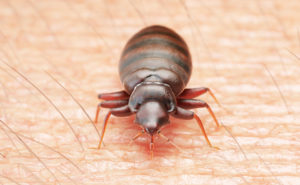
PHOTO: SCIEPRO/SHUTTERSTOCK.COM
New research from West Lafayette, Ind.-based Purdue University finds that plant-based essential oils can be lethal for bed bugs, particularly in combination with deltamethrin. The Purdue University AgSEED program, the Center for Urban and Industrial Pest Management, and the Bilsland Dissertation Fellowship supported this research as a part of the doctoral dissertation for then-graduate student Sudip Gaire, who published two papers on the findings (both in the journal Pesticide Biochemistry and Physiology, in 2020 and 2021) with Purdue entomologist Dr. Ameya Gondhalekar and additional team members. Dr. Gaire is now a post-doctoral scholar at the University of Kentucky, Lexington, Ky.
“Our findings show that essential oils can kill bed bugs, but the combination of essential oils and pyrethroid insecticides has a synergistic effect,” Dr. Gondhalekar said in a Purdue news article.
Drs. Gaire and Gondhalekar first tested the pyrethroid insecticide deltamethrin and a series of essential oil compounds on non-resistant bed bugs and a resistant Knoxville, Tenn., strain of bed bugs. According to the news release:
The active ingredients in essential oils — thymol from thyme, carvacrol from oregano and thyme, eugenol from clove, and others — worked equally against resistant and non-resistant bugs. A dose meant to kill 25 percent killed that many of each type.
Dr. Gondhalekar said bugs’ nervous systems normally open and close sodium channels to pass signals through neurons. Deltamethrin binds to those sodium channels and keeps them open so that neurons cannot stop firing. That repeated firing quickly uses up the bug’s energy and kills it.
But resistant bed bugs possess multiple mechanisms to resist pyrethroids, including overactive levels of an enzyme called cytochrome P450, which degrades deltamethrin. The essential oil compounds, Drs. Gaire and Gondhalekar reported, bind to and deactivate that enzyme and allow deltamethrin to do its job on the bed bug’s nervous system.
Drs. Gaire and Gondhalekar combined a single dose of deltamethrin with a single dose of essential oil compounds that would be expected to kill 25 percent to 50 percent of the resistant bed bugs. Instead, it killed more than 90 percent of the resistant bed bugs.
“When we treated the resistant Knoxville bed bugs with different essential oils and tested for cytochrome P450, we found these enzymes were inhibited,” Dr. Gaire said. “The essential oil compounds were able to neutralize those enzymes, allowing the deltamethrin to do its job.”
According to the news release, Dr. Gondhalekar’s lab plans to continue researching potential formulations of essential oils with additional pyrethroid insecticides, testing them in the lab and in the field.
The post Purdue research: Essential oils add to bed bug control appeared first on Pest Management Professional.
from Pest Management Professional https://www.mypmp.net/2021/04/19/purdue-research-essential-oils-add-to-bed-bug-control/
Sacramento CA
No comments:
Post a Comment